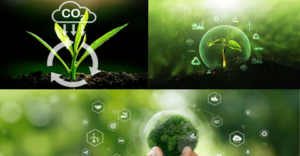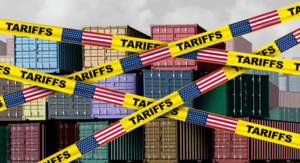
Ghana's Role in Carbon Credit Innovation: Unlocking Sustainable Solutions
Ghana’s role in carbon credit innovation shines as a beacon of sustainable progress amidst global climate challenges. With over 15 years of dedicated effort, Ghana emerges as a leader in forest conservation, offering high-integrity carbon credits poised to redefine environmental stewardship.
Through innovative strategies and community engagement, Ghana pioneers jurisdictional programs that not only offset emissions but also empower local communities. By entering the voluntary carbon market and securing landmark agreements like the LEAF Coalition, Ghana sets a precedent for integrating conservation with economic prosperity.
As buyers seek to meet climate targets, Ghana emphasizes the true value of carbon credits, emphasizing integrity, impact, and fair pricing reflective of real environmental achievements.
Ghana’s Role in Carbon Credit Innovation
In recent years, the intensifying scrutiny from media outlets has propelled numerous companies towards a quest for high-quality carbon credits. This shift arises from a desire to avoid accusations of “greenwashing” and a genuine commitment to offsetting emissions while fostering tangible benefits for local communities.
The Ghanaian government emerges as a key player poised to facilitate this transition, leveraging over 15 years of dedicated efforts in developing a robust forest-conservation program.
Table of Contents
1. A Unique Approach to Carbon Credits
Ghana’s initiative distinguishes itself from traditional forest-protection schemes. Unlike individual projects that often face criticism for prioritizing corporate interests, Ghana’s jurisdictional programs are designed to tackle deforestation and forest degradation on a larger scale.
By covering vast areas and mitigating risks of illegal deforestation, these initiatives prioritize environmental preservation while addressing community needs. Moreover, Ghana’s role in carbon credit innovation further enhances the effectiveness of these jurisdictional programs by incentivizing sustainable practices and attracting investment in forest conservation efforts.
Read More: Impact of Debt Crisis On Climate Action
2. Foundation in International Agreements
The foundation for Ghana’s carbon credit innovation, including its role in pioneering initiatives, can be traced back to international agreements like the 2015 Paris climate accord. Article 5 of this agreement encourages developed nations to offer payments to developing countries for achieving emissions reductions.
Over the past decades, Ghana has actively engaged with global partners and funding mechanisms like the Forest Carbon Partnership Facility (FCPF), the World Bank, and the Green Climate Fund to bolster its conservation efforts. Ghana’s role in carbon credit innovation highlights its commitment to sustainable development and environmental stewardship on both local and global scales.
3. Strategic Intervention Areas
Ghana identified five critical commodity-linked areas for intervention within its High Forest Zone, a biodiversity hotspot within the Guinean Forests of West Africa. Through community engagement and tailored benefit-sharing strategies, the government sought to align conservation efforts with local stakeholders’ needs.
Additionally, Ghana’s role in carbon credit innovation has been pivotal in this endeavor. Moreover, investments in specialized measurement technologies have enhanced monitoring capabilities, ensuring the accuracy of carbon storage assessments.
Read More: Impact of Climate Change
4. Entry into the Voluntary Carbon Market
After nearly two decades of groundwork, Ghana is poised to enter the voluntary carbon market. Through the Architecture for REDD+ Transactions (ART) process, the country aims to issue jurisdictional carbon credits, inviting domestic and international companies to support its conservation endeavors. Ghana’s role in carbon credit innovation in this context not only aligns with global climate objectives but also presents an opportunity for sustainable revenue generation.
Read More: Food Security and Development in Africa
5. Partnerships for Emissions Reduction
Ghana’s commitment to emissions reduction is underscored by partnerships such as the agreement with the Lowering Emissions by Accelerating Forest Finance (LEAF) Coalition. This landmark deal is set to provide Ghana with $50 million for reducing carbon dioxide emissions by up to five million tons.
Ghana’s role in carbon credit innovation further enhances these efforts. Such partnerships not only validate Ghana’s efforts but also provide crucial financial support for ongoing conservation initiatives.
Read More: Green Hydrogen Development in Africa
6. Local Benefits of Carbon Credits
While carbon credits are instrumental for buyers in the Global North in meeting climate targets, they hold a deeper significance for Ghana. Ghana’s role in carbon credit innovation has been pivotal, as revenue generated from these credits translates into tangible income for local communities, offering financial incentives for forest preservation.
This economic empowerment not only bolsters environmental stewardship but also fosters sustainable development at the grassroots level.
7. The True Value of High-Integrity Credits
As Ghana navigates the carbon credit landscape, it emphasizes the importance of integrity and impact, including Ghana’s role in carbon credit innovation. High-quality credits must extend beyond corporate climate strategies to genuinely contribute to forest preservation.
Recognizing the true cost of producing such credits, potential buyers should engage with countries like Ghana to understand the challenges and value associated with emission reductions. Pricing discussions should reflect the real value of accomplishments and exceed the returns on illegal deforestation activities.
Bottom Line
In conclusion, Ghana’s journey towards carbon credit innovation epitomizes a holistic approach to environmental conservation and sustainable development. By leveraging international partnerships, community engagement, and technological advancements, Ghana stands at the forefront of unlocking sustainable solutions to combat deforestation and mitigate climate change.
As the world grapples with the urgent need for emissions reductions, Ghana’s experience offers valuable insights into the transformative potential of carbon credits in safeguarding our planet’s future.







